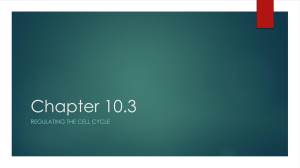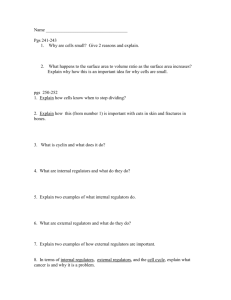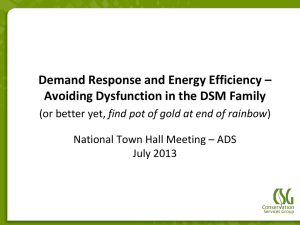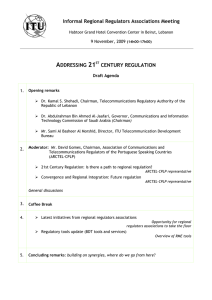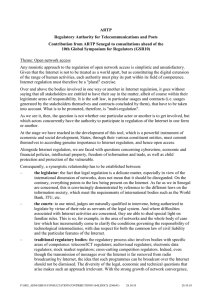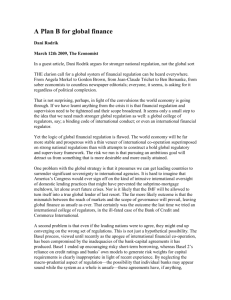Ladies and Gentlemen,
advertisement
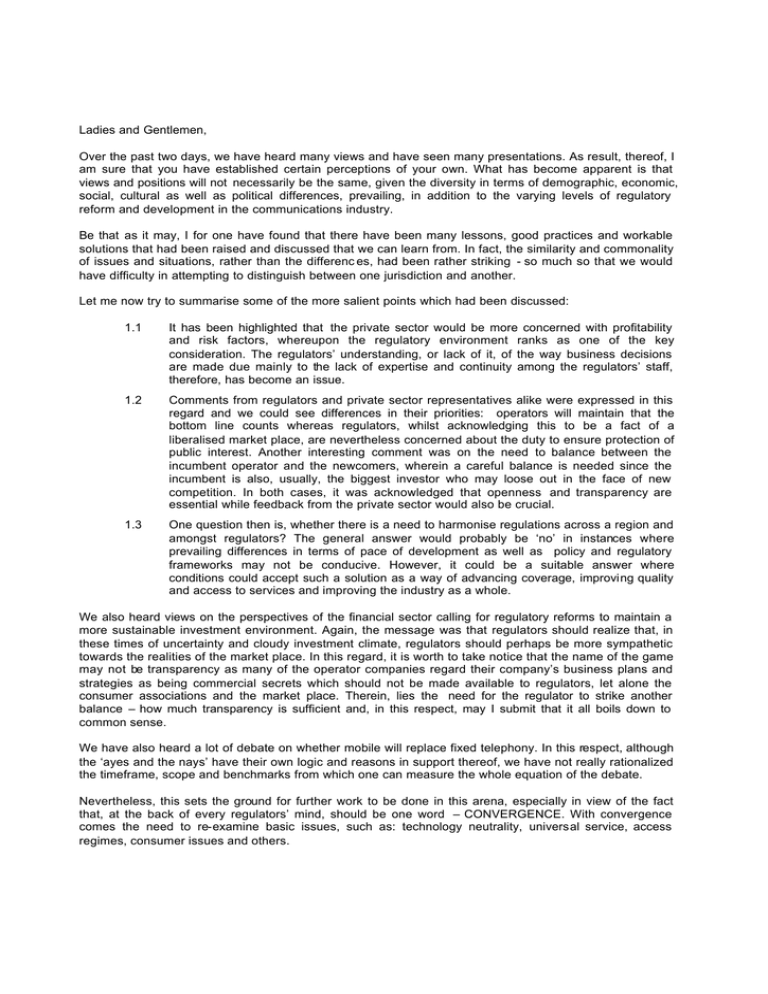
Ladies and Gentlemen, Over the past two days, we have heard many views and have seen many presentations. As result, thereof, I am sure that you have established certain perceptions of your own. What has become apparent is that views and positions will not necessarily be the same, given the diversity in terms of demographic, economic, social, cultural as well as political differences, prevailing, in addition to the varying levels of regulatory reform and development in the communications industry. Be that as it may, I for one have found that there have been many lessons, good practices and workable solutions that had been raised and discussed that we can learn from. In fact, the similarity and commonality of issues and situations, rather than the differenc es, had been rather striking - so much so that we would have difficulty in attempting to distinguish between one jurisdiction and another. Let me now try to summarise some of the more salient points which had been discussed: 1.1 It has been highlighted that the private sector would be more concerned with profitability and risk factors, whereupon the regulatory environment ranks as one of the key consideration. The regulators’ understanding, or lack of it, of the way business decisions are made due mainly to the lack of expertise and continuity among the regulators’ staff, therefore, has become an issue. 1.2 Comments from regulators and private sector representatives alike were expressed in this regard and we could see differences in their priorities: operators will maintain that the bottom line counts whereas regulators, whilst acknowledging this to be a fact of a liberalised market place, are nevertheless concerned about the duty to ensure protection of public interest. Another interesting comment was on the need to balance between the incumbent operator and the newcomers, wherein a careful balance is needed since the incumbent is also, usually, the biggest investor who may loose out in the face of new competition. In both cases, it was acknowledged that openness and transparency are essential while feedback from the private sector would also be crucial. 1.3 One question then is, whether there is a need to harmonise regulations across a region and amongst regulators? The general answer would probably be ‘no’ in instances where prevailing differences in terms of pace of development as well as policy and regulatory frameworks may not be conducive. However, it could be a suitable answer where conditions could accept such a solution as a way of advancing coverage, improving quality and access to services and improving the industry as a whole. We also heard views on the perspectives of the financial sector calling for regulatory reforms to maintain a more sustainable investment environment. Again, the message was that regulators should realize that, in these times of uncertainty and cloudy investment climate, regulators should perhaps be more sympathetic towards the realities of the market place. In this regard, it is worth to take notice that the name of the game may not be transparency as many of the operator companies regard their company’s business plans and strategies as being commercial secrets which should not be made available to regulators, let alone the consumer associations and the market place. Therein, lies the need for the regulator to strike another balance – how much transparency is sufficient and, in this respect, may I submit that it all boils down to common sense. We have also heard a lot of debate on whether mobile will replace fixed telephony. In this respect, although the ‘ayes and the nays’ have their own logic and reasons in support thereof, we have not really rationalized the timeframe, scope and benchmarks from which one can measure the whole equation of the debate. Nevertheless, this sets the ground for further work to be done in this arena, especially in view of the fact that, at the back of every regulators’ mind, should be one word – CONVERGENCE. With convergence comes the need to re-examine basic issues, such as: technology neutrality, universal service, access regimes, consumer issues and others. You will agree with me that there were interesting moments from the session on REGULATORY CHALLENGES: FEEDBACK FROM CONSUMERS 1.4 Here again the regulator was asked to play the role of a juggler to balance the needs of the operator and consumer. In this respect, it is well worth to visualize that the similarities between the consumers worldwide are astounding: one cannot really differentiate between the countries,b rich or poor, developing or developed. At the end of the day, we are all at various stages of incorporating consumer’s needs and rights within the regulatory frameworks. Judging from the results of the feedback survey, it may be the case that regulators have a long way to go before we reach this very important aspect of greater consumer awareness and empowerment. 1.5 This brings us to the need for performance indicators to measure, amongst other things, consumer satisfaction and quality of service. Without the establishment of relevant indicators, it would be difficult for regulators to make any significant progress in terms of ensuring consumer satisfaction, other than to handle complaints in the most basic manner. Ladies and gentlemen, 1.6 I wish to refer, at this point, to the many models of universal service that were presented in this symposium. 1.7 Issues were raised regarding affordability and sustainability of universal service and the suitability of the telecentre franchise method as an option. 1.8 Nevertheless, there is still the need to pursue the search for a workable solution, bearing in mind that “no one size fits all” and that universal service is still on a development mode. There are, indeed, many challenges that regulators have to face in going forward and this symposium has provided us with a lot of information within the short time span of the past two days. Hopefully, we can put our time here to good use by transforming such information into knowledge-giving outputs which would become reference points for invaluable ideas and action plans, not only in our own countries but also as a platform for a common search of regulatory harmonization. As a matter of fact, I believe that the output of this Symposium would be invaluable to the preparatory work of the World Summit on the Information Society. As such, I would like to propose that the Chairperson’s Report on this Third Symposium be submitted as input to the preparation of the draft Action Plan to be considered by the next Prepcon for WSIS in February 2003. This would, among others, ensure that there will be mention of the key role that regulatory bodies could play, if strongly supported by the international community, to prepare and enforce regulations, provide guidelines, develop models and financing mechanisms while recognizing both the role and expectations of the private sector as well as the social dimension of services and applications provided through communications services providers. On that note, ladies and gentlemen, I would like to thank the ITU, our host OFTA and other organizations involved in making this event, that is, the Third Global Symposium for Regulators, possible. In particular, I wish to thank the support staff, interpreters, consultants, presenters and panelists who have so graciously given us their time and support. My special thanks to the participants who have responded so positively to my request for interactive participation throughout the symposium. Thank you.
